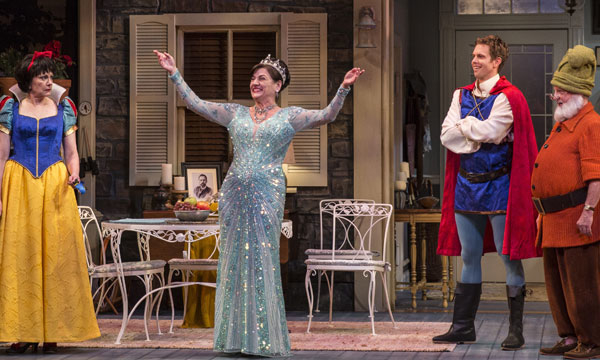Vanya and Sonia and Masha and Spike

(courtesy of The Goodman)
Chekhov called The Seagull and The Cherry Orchard comedies, but there’s no denying the powerful currents of tragedy running through them. The laughs are far more overt in contemporary playwright Christopher Durang’s Vanya and Sonia and Masha and Spike, with Durang unleashing pure zaniness while riffing on Chekhov’s melancholic masterpieces. Directed by Steve Scott for the Goodman Theatre, the play whipsaws between wacky sight gags and sorrowful profundity.
Durang’s plot is anchored more in extreme emotions rather than events. The opening scenes establish 50-something brother and sister Vanya (Ross Lehman) and Sonia (Janet Ulrich Brooks) as lonely, frustrated, and awash in regret for their paths not taken. They’ve spent their best years caring for ailing, elderly parents whose deaths have left them mired in purposelessness and anger, glowering over their coffee and occasionally erupting with crockery-tossing rage and frustration. Adding to their unease is their prescient housekeeper, aptly named Cassandra (E. Faye Butler). As Cassandra warns of doom in a florid Jamaican accent, the third sibling shows up. Masha (Mary Beth Fisher) is a movie star, whose jet-setting life is all premieres, exotic location shoots, and hunky younger men. She sweeps in with her boy toy, Spike (Jordan Brown), who quickly reveals himself as a fellow whose abs are sharper than his brain.
Vanya and Sonia’s next-door neighbor Nina (Rebecca Buller), a sweet, aspiring young actress filled with earnest optimism, is awestruck by the presence of Masha. But Masha’s homecoming is due to her plan to sell the family estate, which sets the siblings into a prolonged argument. Vanya and Sonia are outraged that their rich, long-absent sister would render them homeless in order to make even more money. But before Vanya and Sonia’s imminent homelessness comes to pass, Masha has a costume party to attend, which gives Durang a reason to have everyone parade about in marvelously dopey costumes inspired by the Disney version of Snow White and the Seven Dwarves. The sight of Nina, dressed as Dopey, delivering an earnest paean to the glory of living, is a trippy triumph of the ridiculous and the sublime.
Much of the fun in Vanya and Sonya and Masha and Spike comes from playing name-the-Chekovian-reference, a game that’s obviously especially suited toward theater folk and English majors. But the play stands on its own thanks in large part to the cast’s committed loopiness. Scott and his cast don’t pull off a balancing act so much as an acrobatic one as the dialogue bounces from sadness to slapstick.
Fisher brings a formidable intelligence to the self-absorbed Masha, and Brown’s Spike takes vapidness to chuckle-worthy extremes. (A running joke involves the pride Spike has in his biggest career accomplishment to date: nearly getting cast in Entourage II.) Butler isn’t afraid to go big – nay, huge – with her Island accent and dire pronouncements. When it comes time for her to start stabbing Masha via voodoo doll, the humor is as irresistible as it is blatantly obvious.
But the heart of the show is Brooks and Lehman. The latter’s depiction of a lonely woman of a certain age is absolutely heartbreaking. Still, Sonia is no tragic victim. There’s strength in her anger and enough acerbic wit to leave scars should you cross her. And her costume party triumph will have you cheering. Lehman ferociously delivers a showstopper of a monologue in the final act that will resonate with anyone who grew up before the advent of self-adhesive postage stamps and satellite TV.
Walt Spangler’s detailed set makes the siblings’ Bucks County, Pennsylvania home look ready to move in to, from the sunny terrace where Sonia’s frustration explodes in a volley of hurled coffee cups to the staircase where Masha makes her Norma Desmond-esque entrance as Snow White. Amy Clark’s costumes reflect the characters well: Sonia’s first-act bathrobe is depression in the form of clothing, Masha’s heels, skinny-jeans, and oversize sunglasses scream "high maintenance movie star."
Both the humor and the malaise in Vanya and Sonia and Masha and Spike is about as subtle as a truck, but it is also whip-smart and emotionally barbed. It’s a dicey task, blending wackiness with melancholy. Durang and Scott’s band of fearless actors make comedy, famously harder than dying, look easy.











